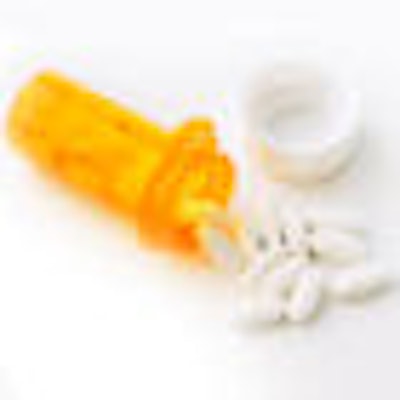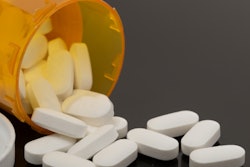
Years ago, Louis Woolf, D.D.S., decided to keep all his prescription pads behind the front desk of his Holbrook, NY, office. When he kept pads in operatories, they kept disappearing, and as a former addict he had no trouble guessing that patients were stealing them to get drugs he wouldn't prescribe.
Moving his prescription pads is just one of the precautions that Dr. Woolf has taken in his practice to address the staggering problem of prescription medicine abuse.
"Addicts are very sly," said Dr. Woolf, who has taken courses on how to avoid being conned by them. He's ahead of the trend. More that 50 million people have abused prescription-type drugs at some time in their life -- that's more than any other category of drug except marijuana, according to the 2007 National Survey on Drug Use & Health.
“Ten years ago, there were not a lot of these drugs out there. Now they are being handed out like candy.”
— Keith Berge, M.D.
The prescription drugs most abused are opioids (synthetic compounds that act on opiate receptors), particularly oxycodone and hydrocodone (common brand names include OxyContin, Vicodin, and Percocet).
After years of rapid increase, the number of people abusing these drugs leveled off in the latest surveys, but many dentists are just beginning to realize how many people are trying to manipulate them. "I don't think doctors are aware of how huge a problem it is," said Keith Berge, M.D., a Mayo Clinic anesthesiologist who co-authored an editorial on opioids in the July 2009 Mayo Clinic Proceedings (Vol. 84:7, pp. 625-631). "Ten years ago, there were not a lot of these drugs out there. Now they are being handed out like candy."
The prescription drug overdose deaths of actor Heath Ledger and model Anna Nicole Smith in recent years have called attention to the problem, as have reports on celebrity-watching blogs that singer Michael Jackson was abusing prescriptions from dentists just before his death.
Too many pills
Such drugs are being abused more partly because physicians and dentists are prescribing them more, Dr. Berge said. According to statistics from market research company IMS Health (cited in an editorial in the same issue of the Mayo Clinic Proceedings), opioid prescriptions increased about 50% from 1998 to 2002.
Innovations have made opioids more effective, leading to wider legitimate use and higher expectations, according to the editorial. "In the past, these drugs were used by people who were dying of cancer," Dr. Berge said. "Now they are used by everybody who is in pain. There's this push that everybody should be pain-free; nobody should suffer pain."
The Internet has contributed to the problem as well, said U.S. Drug Enforcement Agency (DEA) spokesman Rusty Payne. "We've spent a lot of time and resources on trying to disrupt illegitimate pharmaceutical Web sites," he said.
The DEA is also working to coordinate databases of legitimate pharmacies so that it becomes clear when an addict is getting medicine from multiple doctors and multiple pharmacies.
Yet according to the 2007 drug use survey, only 0.5% of teens and adults who use prescription drugs "nonmedically" get them from the Internet. Almost half (46%) reported that they most recently got the drugs from a friend or relative who had obtained the drugs from a single doctor. "They are going into grandma's medicine cabinet," Dr. Berge said. Another 18% got the drugs directly from a doctor.
What can dentists do?
The first step to solving the problem is not to prescribe so much, said James Stillwell, executive director of Impact Drug and Alcohol Treatment Center in Pasadena, CA. He recounted the story of getting a root canal. The dentist offered him 30 pills. Stillwell, himself a recovering addict, said, "I don't need 30. Give me 6."
The center has lost several staff members who relapsed into drug abuse after visits to the dentist, Stillwell said, adding that he has known many addicts who first became addicted to drugs when they took codeine after a dental visit. Anyone who takes opioids for a couple of weeks is going to have difficulty stopping, he said, yet the doctors who prescribe the medications seldom provide warnings or support to help wean patients from their dependence.
Dr. Woolf rarely prescribes drugs with oxycodone or hydrocodone. "I personally believe that nonsteroidal anti-inflammatories work just as well," he said. If patients insist they need something stronger, he offers tramadol (Ultram, Zytram XL), an opioid marketed as being less likely to cause dependence.
If a patient asks for a specific type of pain reliever, that may be a clue that the patient is addicted, Dr. Woolf said. (For a list of other warning signs -- and how to respond -- see the DEA's "Don't Be Scammed by a Drug Abuser.")
Many of these patients may not even realize they are abusing drugs. The prescription legitimizes their behavior in their own eyes. At the other extreme, some of those seeking drugs may be pushers. A pill that sells for $1 in a pharmacy can go for $100 on the street.
Dentists should also guard against "doctor shopping," he said. Many addicts call one dentist after another -- often near the end of office hours -- complaining of tooth pain and hoping to reach a dentist too busy to see them right away. When the dentist offers to schedule them for later in the week, they ask for a pain reliever to last them until that appointment. They're hoping the dentist will write them a prescription without examining them.
When Dr. Woolf gets calls like that, he tells them they won't get anything stronger than ibuprofen from him. Usually, that's the end of the conversation. Stillwell advises dentists to tell late afternoon callers to go to an emergency room for their interim pain reliever.
But that may not be the last you hear from an addict. Some will go to tremendous lengths to convince doctors they need the medication, even faking health problems. Stillwell told the story of one recovering addict -- now working as a cook at the Impact center -- who had a tooth extracted unnecessarily just so he could get the prescription he wanted.
Such manipulation knows no bounds. While dentists and physicians can dramatically slow the flow of abuse, they will never stop it on their own. "If you have a propensity to use and abuse, you're going to find a way," Stillwell said.
Copyright © 2009 DrBicuspid.com



















